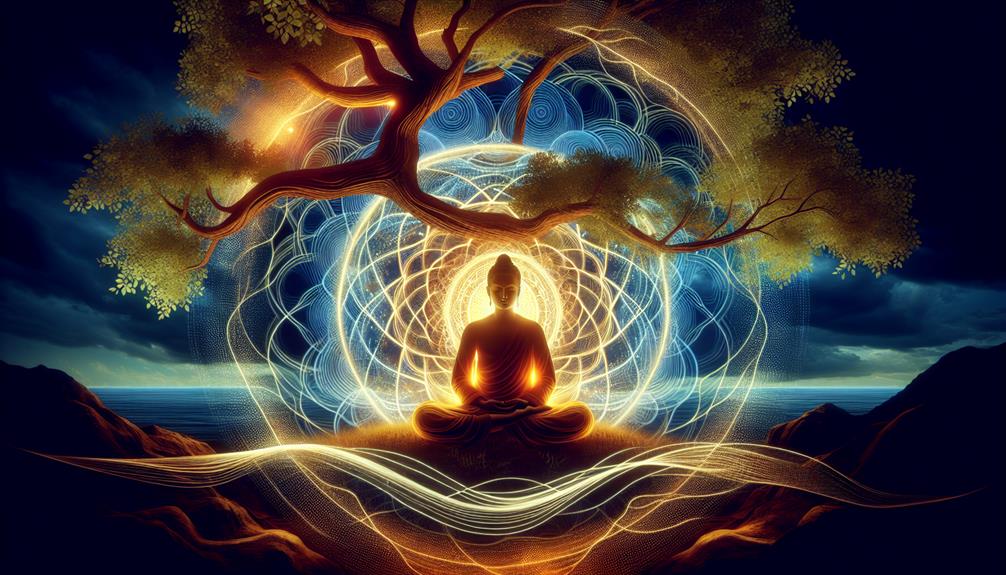What Is The Buddhist Definition Of Karma
Karma is a fundamental concept in Buddhism, shaping the understanding of cause and effect in one's life. The Buddhist definition of karma delves into intricate connections between actions and their consequences, both in this life and beyond.
What Is The Buddhist Definition Of Karma
By exploring the origins of karma in Buddhist teachings and its role in shaping the cycle of rebirth, we can gain insight into the profound implications of this doctrine. Understanding the various types of karma according to Buddhist philosophy provides a framework for practicing mindfulness and cultivating positive actions.
What Is The Buddhist Definition Of Karma
Key Takeaways
- Karma in Buddhism is a law of cause and effect.
- Intention behind actions influences karmic outcomes.
- Karma extends beyond a single lifetime.
- Good karma leads to enlightenment and liberation.
Origins of Karma in Buddhism
The concept of karma in Buddhism traces its origins back to the teachings of Siddhartha Gautama, the historical Buddha. Karma, derived from the Sanskrit word meaning 'action' or 'deed,' is a fundamental belief in Buddhist philosophy. It refers to the law of cause and effect: the idea that intentional actions have consequences, shaping one's present life and future existences.
What Is The Buddhist Definition Of Karma
For Buddhists seeking belonging within their community, understanding karma is essential as it provides a framework for moral responsibility and personal growth. By acknowledging the impact of their actions, individuals can cultivate positive karma through wholesome deeds and intentions. This process is seen as a means to progress along the path towards enlightenment and liberation from the cycle of rebirth.
What Is The Buddhist Definition Of Karma
Through the teachings of the Buddha, followers learn that karma is not predetermined fate but a dynamic force influenced by individual choices. By embracing this belief, practitioners strive to act with mindfulness and compassion, fostering a sense of interconnectedness with all beings. Thus, the origins of karma in Buddhism offer a profound perspective on how personal actions contribute to the collective well-being and spiritual evolution of society.
What Is The Buddhist Definition Of Karma
Understanding Karma in Buddhist Philosophy
Originating from the foundational teachings of Siddhartha Gautama, karma in Buddhist philosophy elucidates the intricate interplay between actions and their subsequent consequences. In Buddhist belief, karma is not a system of reward or punishment but rather a natural law of cause and effect. It teaches that every action, whether physical, verbal, or mental, has a ripple effect that influences one's future experiences. Understanding karma involves recognizing the power of intention behind actions. According to Buddhist philosophy, the quality of one's intentions influences the karmic outcome more than the action itself.
What Is The Buddhist Definition Of Karma
Moreover, karma is viewed as a continuous process that extends beyond a single lifetime. Buddhists believe in the concept of reincarnation, where the accumulation of karma determines the conditions of future rebirths. This understanding encourages individuals to act with mindfulness and compassion in order to cultivate positive karma and progress towards enlightenment. By grasping the profound connection between actions and their consequences, individuals in the Buddhist community strive to lead virtuous lives guided by the principles of karma.
What Is The Buddhist Definition Of Karma
Types of Karma According to Buddhism
In Buddhism, karma is categorized into various types based on the nature of actions and their consequences. These classifications help individuals understand the intricacies of karma and its impact on their lives. Here are some common types of karma according to Buddhist teachings:
| Type of Karma | Description |
|---|---|
| Good Karma | Actions rooted in generosity, kindness, and compassion that lead to positive outcomes. |
| Bad Karma | Actions driven by greed, hatred, and ignorance, resulting in negative repercussions. |
| Dark Karma | Deliberate harmful actions that cause suffering to oneself and others. |
| Light Karma | Positive actions that bring joy and benefit to oneself and those around them. |
| Mixed Karma | Actions with both positive and negative intentions, leading to a mixed outcome. |
Understanding these different types of karma can guide individuals towards making choices that align with their spiritual growth and well-being. By cultivating good karma and avoiding harmful actions, practitioners can create a more positive future for themselves and others.
The Role of Karma in Rebirth
Karma plays a pivotal role in shaping the cycle of rebirth in Buddhist belief systems. Understanding how karma influences rebirth is essential for followers seeking to navigate the cycle of birth, death, and reincarnation.
Here are three key points to consider regarding the role of karma in rebirth:
- Karmic Energy: Every action, whether positive or negative, generates karmic energy that influences the circumstances of one's future rebirth. This energy is believed to carry forward from one life to the next, shaping the experiences and conditions of each subsequent existence.
- Rebirth Process: The accumulation of karma throughout one's lifetime determines the form and realm into which an individual will be reborn. Rebirth is seen as a continuation of the karmic journey, with each new life offering opportunities for spiritual growth and karmic resolution.
- Breaking the Cycle: By cultivating positive karma through virtuous actions, individuals can strive to break free from the cycle of rebirth (samsara) and attain liberation (nirvana). This process involves purifying negative karma and generating merit through compassionate deeds and ethical living, ultimately leading to spiritual enlightenment and release from the cycle of birth and death.
Practicing Good Karma in Daily Life
Incorporating positive actions and intentions into daily routines fosters a lifestyle conducive to generating good karma in accordance with Buddhist principles. Practicing good karma in daily life involves cultivating virtues such as compassion, generosity, honesty, and mindfulness. These virtues not only benefit the individual but also contribute to the well-being of others and the world at large. Simple acts of kindness, such as helping a neighbor, showing gratitude, or being respectful to all beings, can have a profound impact on one's karmic journey.
Mindful living is a core aspect of practicing good karma. This entails being fully present in each moment, making conscious choices that align with positive values, and avoiding actions that cause harm. By being mindful of our thoughts, words, and deeds, we can ensure that we are sowing seeds of goodness and positivity in our lives.
Ultimately, the practice of good karma in daily life is a continuous and intentional effort to create a more harmonious and compassionate world for oneself and others. By incorporating these principles into our daily routines, we not only benefit from positive karma but also contribute to the collective well-being of society.
Frequently Asked Questions
How Does the Concept of Karma in Buddhism Differ From the Concept in Other Religions or Philosophies?
The concept of karma in Buddhism differs from that in other religions or philosophies by emphasizing the notion of cause and effect based on one's intentions and actions.
In Buddhism, karma is seen as a universal law of moral causation, where one's deeds have consequences that shape future experiences.
Unlike some beliefs that focus on divine judgment or predestination, Buddhism places responsibility on individuals for their own karmic outcomes through mindful living and ethical conduct.
Can Negative Karma Be Erased or Balanced Out by Accumulating Positive Karma in Buddhism?
In Buddhism, the accumulation of positive karma can help balance or counteract negative karma. By engaging in virtuous actions, practicing compassion, and following the Eightfold Path, individuals can gradually diminish the effects of negative karma.
This process involves cultivating mindfulness and intentionality in one's actions to create a more positive karmic imprint. Ultimately, the aim is to purify one's karma and progress towards spiritual enlightenment and liberation from suffering.
Is There a Specific Timeline for When the Effects of Karma Will Manifest in One's Life According to Buddhist Beliefs?
In Buddhist beliefs, the manifestation of karma's effects lacks a specific timeline. The intricate interplay of actions and consequences is influenced by various factors, making it challenging to pinpoint when these effects will materialize.
This uncertainty underscores the importance of cultivating mindfulness and ethical conduct consistently, as karma's repercussions may unfold unexpectedly, prompting individuals to remain vigilant in their actions and intentions.
How Does Collective Karma Work in Buddhism, and How Does It Impact Communities or Societies?
Collective karma in Buddhism refers to the idea that actions and intentions of a group or society can influence their shared destiny. It suggests that communities or societies can experience the consequences of their collective actions.
This concept underscores the interconnectedness of all beings and highlights the importance of ethical behavior not only at an individual level but also at a communal level.
Understanding and addressing collective karma can lead to positive transformation within communities.
Are There Any Practices or Rituals in Buddhism That Are Specifically Aimed at Purifying or Cleansing Negative Karma?
In Buddhism, practices like meditation, chanting, and performing acts of kindness are aimed at purifying negative karma. These rituals help individuals release negative energy and cultivate positive intentions.
Conclusion
In conclusion, the concept of karma in Buddhism is a fundamental aspect of the belief system, shaping the understanding of cause and effect in one's actions.
Like a ripple in a pond, karma reflects the interconnectedness of all beings and the ethical consequences of one's actions.
By practicing good karma in daily life, individuals can cultivate positive outcomes and contribute to their spiritual growth and well-being.

